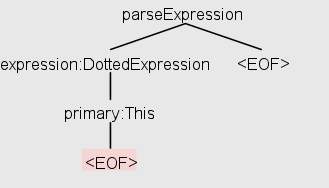I've created this sample grammar using the ANTLR4 plugin in IntelliJ and when I use its tool chain to generate a visual representation for some invalid content (in this case an empty string), this representation seems to differ from what I'm able to get when doing actual parse tree traversal using a sample visitor/listener implementation for same input.
This is the grammar:
grammar TestParser;
THIS : 'this';
Identifier
: [a-zA-Z0-9]+
;
WS : [ \t\r\n\u000C]+ -> skip;
parseExpression:
expression EOF
;
expression
: expression bop='.' (Identifier | THIS ) #DottedExpression
| primary #PrimaryExpression
;
primary
: THIS #This
| Identifier #PrimaryIdentifier
;
For an empty string, I get the following tree:
This tree indicates that the parser built a parse tree that contains "DottedExpression" and "primary:This" (assuming it uses its own visitor/listener implementation to do this). Yet when I attempt the same using the following code:
package org.example.so;
import org.antlr.v4.runtime.CharStreams;
import org.antlr.v4.runtime.CommonTokenStream;
import org.antlr.v4.runtime.tree.ParseTreeWalker;
public class TestParser {
public static void main(String[] args) {
String input = "";
TestParserLexer lexer = new TestParserLexer(CharStreams.fromString(input));
CommonTokenStream tokenStream = new CommonTokenStream(lexer);
TestParserParser parser = new TestParserParser(tokenStream);
TestParserParser.ParseExpressionContext parseExpressionContext = parser.parseExpression();
MyVisitor visitor = new MyVisitor();
visitor.visit(parseExpressionContext);
System.out.println("----------------");
ParseTreeWalker walker = new ParseTreeWalker();
walker.walk(new MyListener(), parseExpressionContext);
System.out.println("----------------");
}
private static class MyVisitor extends TestParserBaseVisitor {
@Override
public Object visitParseExpression(TestParserParser.ParseExpressionContext ctx) {
System.out.println(TestParserParser.ruleNames[ctx.getRuleIndex()]);
return super.visitParseExpression(ctx);
}
@Override
public Object visitDottedExpression(TestParserParser.DottedExpressionContext ctx) {
System.out.println(TestParserParser.ruleNames[ctx.getRuleIndex()] + ":DottedExpression");
return super.visitDottedExpression(ctx);
}
@Override
public Object visitPrimaryExpression(TestParserParser.PrimaryExpressionContext ctx) {
System.out.println(TestParserParser.ruleNames[ctx.getRuleIndex()] + ":PrimaryExpression");
return super.visitPrimaryExpression(ctx);
}
@Override
public Object visitThis(TestParserParser.ThisContext ctx) {
System.out.println(TestParserParser.ruleNames[ctx.getRuleIndex()]);
return super.visitThis(ctx);
}
@Override
public Object visitPrimaryIdentifier(TestParserParser.PrimaryIdentifierContext ctx) {
System.out.println(TestParserParser.ruleNames[ctx.getRuleIndex()]);
return super.visitPrimaryIdentifier(ctx);
}
}
private static class MyListener extends TestParserBaseListener {
@Override
public void enterParseExpression(TestParserParser.ParseExpressionContext ctx) {
System.out.println(TestParserParser.ruleNames[ctx.getRuleIndex()]);
}
@Override
public void enterDottedExpression(TestParserParser.DottedExpressionContext ctx) {
System.out.println(TestParserParser.ruleNames[ctx.getRuleIndex()] + ":DottedExpression");
}
@Override
public void enterPrimaryExpression(TestParserParser.PrimaryExpressionContext ctx) {
System.out.println(TestParserParser.ruleNames[ctx.getRuleIndex()] + ":PrimaryExpression");
}
@Override
public void enterThis(TestParserParser.ThisContext ctx) {
System.out.println(TestParserParser.ruleNames[ctx.getRuleIndex()]);
}
@Override
public void enterPrimaryIdentifier(TestParserParser.PrimaryIdentifierContext ctx) {
System.out.println(TestParserParser.ruleNames[ctx.getRuleIndex()]);
}
}
}
I get the following output:
line 1:0 mismatched input '<EOF>' expecting {'this', Identifier}
parseExpression
expression:PrimaryExpression
----------------
parseExpression
expression:PrimaryExpression
----------------
So, not only the tree depths do not match, the output even indicates a different rule was matched second ("PrimaryExpression" instead of "DottedExpression").
Why is there such a difference between what I'm shown and what I attempt to show? How do I create the same tree representation as shown by the plugin?
Using ANTLR version 4.7. Plugin version is 1.8.4.

